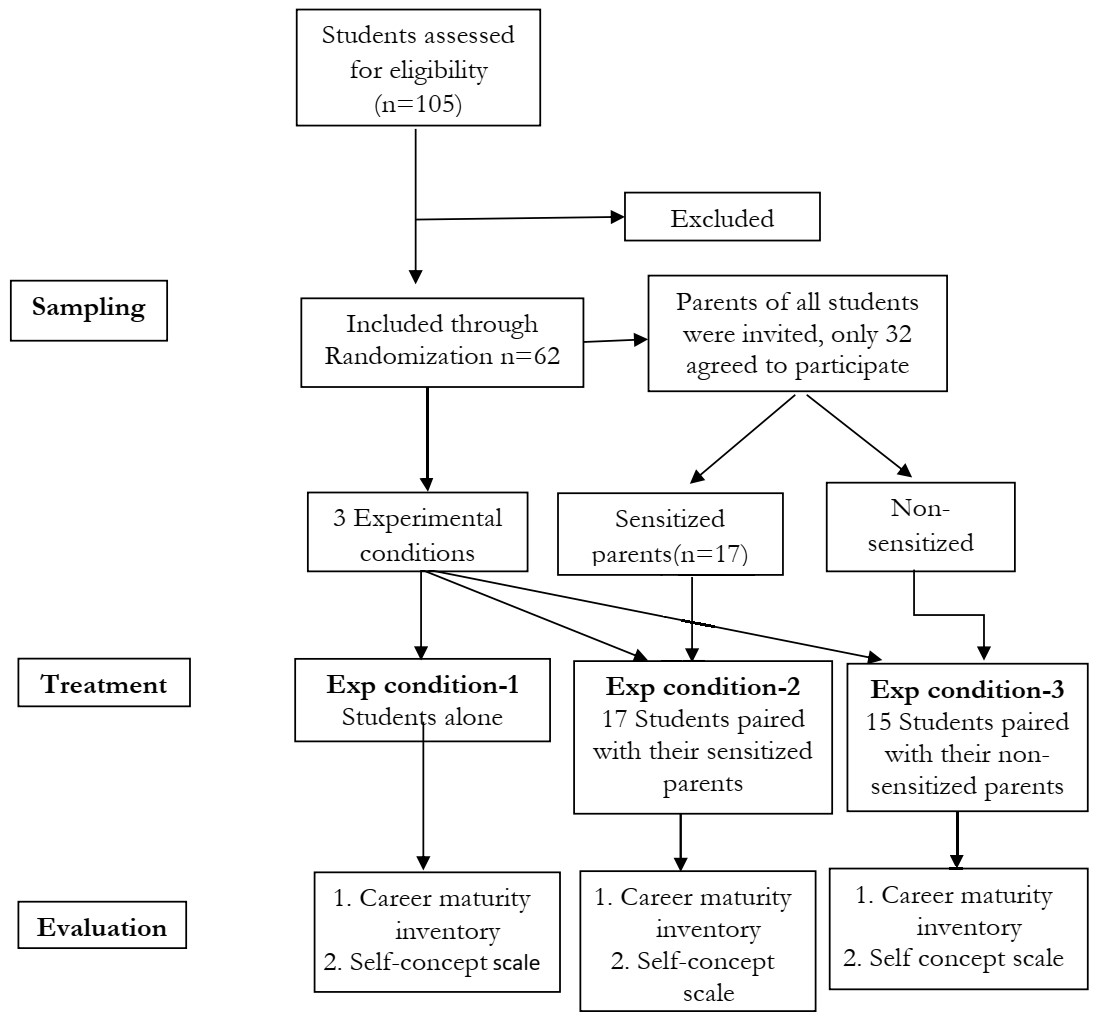Impact of Parental Participation in Career Exploration Programs on High School Learner’s Self-Concept
Keywords:
Self-concept, Career key, Learners, Focus group, Parental participationAbstract
This study aims to understand the extent to which parents influence their children's career growth and how it influences their self-concept. In this study, we created a career exploration program in-house, which included both parents and their children. For the sensitization of the parents, two focus group discussion sessions were carried out, proceeded with a 52-item as a self-concept assessment. Using real-world case studies and logical debates, a total of 17 fathers were provided with information throughout the focus group session. After that, a posttest between group design was used to assess the impact of career development intervention on three different groups through highly reliable. A total of 62 adolescents were divided into three experimental group: 30 students were classified as alone, 15 students were partnered with their parents (n = 30), and 17 students were matched with 17 parents who had been educated to the issue through focus group discussions. The outcomes show that kids with informed parents did better than students alone and students with non-sensitised parents in terms of self-concept. Regression equation was found significant (F (1, 60) = 6.745, p=0.012), with an R2 of 0.101, which stated that student’s self-concepts holds 8.6% of the explained variability in Career exploration settings. The study's findings will be useful to policy makers, educators, parents, students, and researchers.
References
P. L. Lau, Y. B. Chung, and L. Wang, “Effects of a Career Exploration Intervention on Students’ Career Maturity and Self-Concept,” https://doi.org/10.1177/0894845319853385, vol. 48, no. 4, pp. 311–324, Jun. 2019, doi: 10.1177/0894845319853385.
J. Post, “International practices of career services, credentials and training,” Br. J. Guid. Counc., vol. 48, no. 3, pp. 440–441, May 2020, doi: 10.1080/03069885.2019.1692129.
J. B. B. and J. S. Lyon, “Effects of a career exploration program on middle school students’ career aspirations and expectations,” J. Career Dev., vol. 42, no. 6, pp. 475–489, 2015.
“APA PsycNet.” Accessed: Oct. 31, 2023. [Online]. Available: https://psycnet.apa.org/doiLanding?doi=10.1037/a0032794
and R. G. S. L.P. Tan, “The impact of career exploration programs on students’ career readiness: A study of Singaporean high school students,” J. Career Dev., vol. 46, no. 6, pp. 660–674, 2019.
R. F. Baumeister, “Identity, Self-Concept, and Self-Esteem: The Self Lost and Found,” Handb. Personal. Psychol., pp. 681–710, Jan. 1997, doi: 10.1016/B978-012134645-4/50027-5.
R. J. Shavelson, J. J. Hubner, and G. C. Stanton, “Self-Concept: Validation of Construct Interpretations,” Rev. Educ. Res., vol. 46, no. 3, pp. 407–441, Sep. 1976, doi: 10.3102/00346543046003407/ASSET/00346543046003407.FP.PNG_V03.
S. Kanten, P. Kanten, and M. Yeşiltaş, “The Role of Career Self-Efficacy on the Effect of Parental Career Behaviors on Career Exploration: A Study on School of Tourism and Hotel Management’ Students,” Eur. J. Multidiscip. Stud., vol. 6, no. 1, pp. 152–171, Dec. 2021, doi: 10.26417/EJMS.V3I1.P143-154.
H. Qudsyi, V. R. D. Wantara, A. R. Putri, and F. Ramadhaniaty, “Parental Involvement, Peer Support, Authoritarian Parenting, and Prediction to Career Decision-making Self-efficacy among High School Students,” pp. 554–561, Nov. 2020, doi: 10.5220/0009023805540561.
and A. A. M. S.T. Zahra, “Role of significant others on high school students subject/career selection: An exploratory study,” Int. J. Innov. Sci. Res., vol. 33, no. 1, pp. 83–93, 2017.
L. K. Jones, “The Career Key Manual (2nd ed.), Hood River, OR: Career Key,” 2010.
and M. A. K. S. Hussain, K.L. Jones, N. Fouad, I.M. Ismail, “Adaptation of the Career Key into Urdu,” Pakistan J. Psychol. Res., vol. 29, no. 2, pp. 187–201, 2014.
S. M. R. Ting and L. K. Jones, “The development and field testing of the Chinese Career Key among high school and college students in Hong Kong,” Int. J. Educ. Vocat. Guid., vol. 5, no. 3, pp. 281–292, 2005, doi: 10.1007/S10775-005-3599-9/METRICS.
and S. K. Z.A. Ansari, G. N. Farooqi, M. Yasmin, “Development of an Urdu Checklist: A Preliminary report Islamabad,” Natl. Inst. Psychol., 1982.
D. Lakens, “Calculating and reporting effect sizes to facilitate cumulative science: A practical primer for t-tests and ANOVAs,” Front. Psychol., vol. 4, no. NOV, p. 62627, Nov. 2013, doi: 10.3389/FPSYG.2013.00863/ABSTRACT.
and A. O. M. O. O. Isaac, “Effects of parental influence on adolescents’ career choice in badagry local Government area of Lagos State, Nigeria,” IOSR J. Res. Method Educ., vol. 4, no. 3, pp. 44–57, 2014.
L. Halim, N. Abd Rahman, R. Zamri, and L. Mohtar, “The roles of parents in cultivating children’s interest towards science learning and careers,” Kasetsart J. Soc. Sci., vol. 39, no. 2, pp. 190–196, May 2018, doi: 10.1016/J.KJSS.2017.05.001.
and S. T. J. Taylor, M. Harris, “Parents have their say about their college aged children’s career decisions,” Natl. Assoc. Coll. Employers J., vol. 64, no. 3, 2014.
U. Yaqoob, F. Arif, M. Samad, and A. Iqbal, “Career counselling and its knowledge among high school students in Pakistan,” Int. J. Community Med. Public Heal., vol. 4, no. 7, pp. 2261–2268, Jun. 2017, doi: 10.18203/2394-6040.IJCMPH20172817.

Published
How to Cite
Issue
Section
License
Copyright (c) 2023 50SEA

This work is licensed under a Creative Commons Attribution 4.0 International License.




















